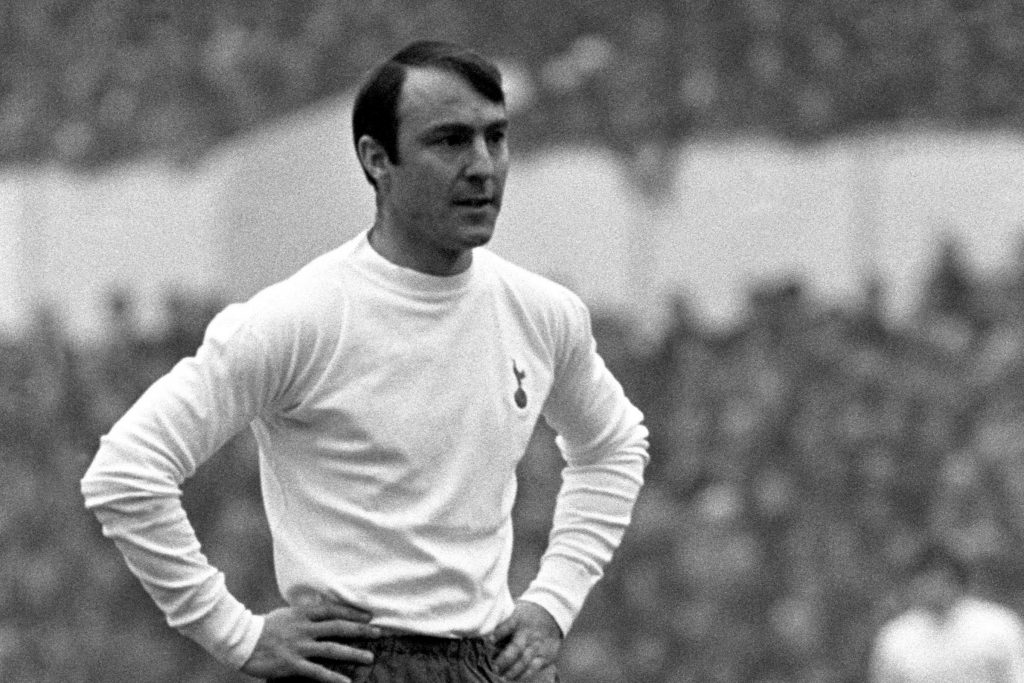Former England striker Jimmy Greaves, seen here playing against France in the 1966 World Cup, has died aged 81
Injury denied him a role in England’s greatest triumph, but Jimmy Greaves, who died on Sunday aged 81, will be remembered as one of the most prolific strikers in English football history.
With 366 goals in 528 top-flight appearances for Chelsea, AC Milan, Tottenham, and West Ham, he scored more goals in Europe’s five major championships than any other player until Cristiano Ronaldo finally surpassed his total in 2017.
Greaves also found the net 44 times for England and while a gashed leg stopped him playing in the 1966 World Cup final win over West Germany, his breath-taking strike rate ensured his legacy remained secure.
Read More: Former England great Jimmy Greaves dies aged 81
Only Bobby Charlton, Gary Lineker, and record holder Wayne Rooney have scored more England goals than Greaves.
“I had a goal drought once,” Greaves used to quip during after-dinner speeches. “Worst 15 minutes of my career.”
A short, quick, and remarkably sure-footed player, Greaves struck the ball unerringly with both feet and was renowned for the deliberateness of his finishing, often rounding the goalkeeper to score.
“When he got the ball in the penalty box, the world stopped,” remembered Greaves’ former West Ham teammate Harry Redknapp.
“It was like somebody had hit pause on the television screen.
“The action around him carried on, but Jim appeared to be operating in another dimension; slower, calmer, making his mind up oblivious to the surrounding frenzy.”
His 266 goals in 379 games for Tottenham make him the club’s all-time leading scorer and he also scored 132 times in 169 games for Chelsea.
Fifty years after his retirement from the professional game, his goal-scoring feats still rank alongside the best of the sport’s modern stars.
Raised in Hainault, northeast London, Greaves joined Chelsea as a teenager, made his debut aged 17, and had scored 100 league goals by the age of 20.
Italian giants Milan signed him in June 1961 for the then significant sum of £80,000 ($121,600), but despite scoring nine goals in 12 Serie A games, he failed to settle in Lombardy.
By December he was back in London with Tottenham, who secured his services for £99,999.
The unique fee was devised by Spurs manager Bill Nicholson, who did not want to saddle Greaves with the burden of being English football’s first six-figure player.
Thus began the great love affair of Greaves’s career.
He won two FA Cups at White Hart Lane, scoring against Burnley in 1962 final, and netted twice in a 5-1 drubbing of Atletico Madrid in the 1963 European Cup Winners’ Cup final, which made Spurs England’s first continental trophy-winners.
He finished as the English top-flight’s leading scorer in six seasons, but on the international scene, fortune was to desert him in the cruelest fashion.
He started the 1966 World Cup on home soil as a guaranteed starter, only for an ugly foul by France’s Joseph Bonnel to leave him with a shin wound that cost him his place in the team.
Greaves was fit to play in the final, but manager Alf Ramsey persevered with West Ham’s Geoff Hurst, who etched his name in English football folklore with a match-winning hat-trick.
“I danced around the pitch with everyone else, but even in this moment of triumph and great happiness, deep down I felt my sadness,” Greaves later reflected.
Greaves struggled with alcoholism towards the end of his top-flight career, which ended at West Ham.
After retiring, he penned a long-running column in tabloid newspaper The Sun and appeared as one half of ‘Saint and Greavsie’ in a television double act with the former Liverpool and Scotland striker Ian St John.
He survived a stroke in 2015 and was awarded an MBE in 2020. He is survived by his wife, Irene, and their four children.

